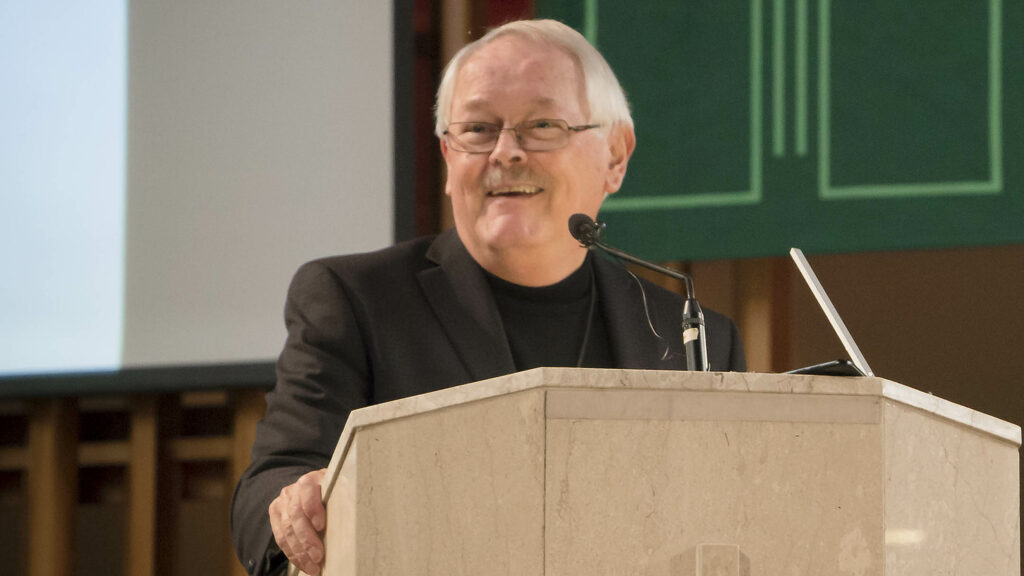We are growing ever more distrustful of words. Everywhere we hear people say: “That’s just talk! That’s nothing but empty words!”
And empty words are all around us. Our world is full of lies, of false promises, of glittering advertising that doesn’t deliver, of words never backed up by anything. We trust less and less in what we hear. We’ve been lied to and betrayed far too often, now we’re cautious about what we believe.
But distrust in the words we hear is only one way in which our spoken word is weak. Our words can be truthful and still have little power. Why? Because, to use Gospel terms, we may not be speaking with much authority. Our words may not have what they need to back them up. What’s meant by this?
The Gospels tells us that one of things that distinguished Jesus for the other religious preachers of his time was that he spoke with authority, while they didn’t. What gives words authority? What gives them transformative power?
There are, as we know, different kinds of power. There’s a power that flows from strength and energy. We see this, for example, in the body of a gifted athlete who moves with authority.
There’s power too in charisma, in a gifted speaker or a rock star. They too speak with a certain authority and power.
But there’s still another kind of power and authority, one very different in kind from that of the athlete and the rock star. There’s the power of a baby, the paradoxical power of vulnerability, innocence, and helplessness.
Powerlessness is sometimes the real power. If you put an athlete, a rock star, and a baby into the same room, who among them is the most powerful? Who has the most authority? Whatever the power of the athlete or the rock star, the baby has more power to change hearts.
The Gospel texts which tell us that Jesus spoke with “authority” never suggest that he spoke with “great energy” or “powerful charisma”. In describing Jesus’ authority they use the word “exousia”, a Greek word for which we don’t have an English equivalent.
What’s “exousia”? We don’t have a term for it, but we have a concept: “Exousia” might be described as the combination of vulnerability, innocence, and helplessness that a baby brings into a room. Its very helplessness, innocence, and vulnerability have a unique authority and power to touch your conscience.
It’s for good reason that people watch their language around a baby. Its very presence is cleansing.
But there are a couple of other elements too undergirding the authority with which Jesus spoke. His vulnerability and innocence gave his words a special power, yes; but two other elements also made his words powerful: His words were always grounded in the integrity of his life.
As well, people recognized that his authority was not coming from him but from something (Someone) higher whom he was serving. There was no discrepancy between his words and his life. Moreover, his words were powerful because they weren’t just coming from him, they were coming through him from Someone above him, Someone whose authority couldn’t be challenged, God.
You see this kind of authority; for example, in persons like Mother Teresa and Jean Vanier. Their words had a special authority.
Mother Teresa could meet someone for the first time and ask him or her to come to India and work with her.
Jean Vanier could do the same. A friend of mine shares how on meeting Vanier for the first time, in their very first conversation, Vanier invited him to become a missionary priest. That thought had never before crossed his mind. Today he’s a missionary.
What gives some people that special power? “Exousia”, a selfless life, and a grounding in an authority that comes from above. What you see in persons like Mother Teresa and Jean Vanier is the powerlessness of a baby, combined with a selfless life, grounded in an authority beyond them. When such persons speak, like Jesus’, their words have real power to calm hearts, heal them, change them and, metaphorically and really, cast out demons from them.
But we don’t always have to look to spiritual giants like Mother Teresa and Jean Vanier to see this. Most of us have not been so personally influenced by Mother Teresa or Jean Vanier, but have been spoken to with authority by people around us.
In my case, it was my father and mother who spoke to me with that kind of authority. As well some of the Ursuline nuns who taught me in school and some of my uncles and aunts had the power to ask sacrifice of me because they spoke with “exousia” and with an integrity and a faith that I could not question or deny. They asked me to consider becoming a priest and I became one.
What moves the world is often the powerful energy and charisma of the highly talented; but the heart is moved by a different kind of authority.

